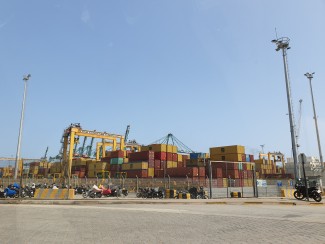Finding new buyers and tapping new markets, harnessing agriculture’s potential
Tewodros Yilma has been in business for 20 years, selling Ethiopia’s agricultural products to buyers abroad.
“Our core business is exports,” he said in the 3rd floor Addis Ababa office of Alpha Trading. “We export oil seeds, mainly sesame seeds, and we export pulses like chickpeas, red beans, green mung beans. Also some spices and some coffee.”
Sending these processed items mainly to Europe, the United States and Asia, Yilma said food products are always in demand.
“We have our own processing plant and we have different certifications, for sanitation for example. So when we send any product to Europe it has to go through different kinds of analysis. We meet all the different standards when we send to our markets,” he said.
Alpha Trading’s plant about an hour outside of Addis Ababa employs approximately 40 people, who do the standards analysis, manage the host of large processing machines, and package items like fava beans into 50 kilogram bags ready to go to the Middle East.
“We’re always trying to identify good markets, new destinations – we do this every year. We participate in exhibitions and different conferences to understand the market outlook for all the products,” he said.
One of the events he attends is the annual Gulfood in Dubai, considered the world’s largest food trade exhibition. Ethiopia’s Ministry of Trade organizes a national exhibition each year at the trade fair, which Yilma joins.
“This has really helped us because they attract on a daily basis maybe more than 80,000 visitors. It’s a four- to five-day exhibition and it has helped us find new buyers and new markets.”
The benefit also includes new information, as Yilma noted that they can discover new uses for products he has access to but never thought to process or export.
For the three years between 2016 and 2019, the Ministry’s exhibition at the event and small businesses like Alpha Trading were sponsored by the Enhanced Integrated Framework (EIF), coinciding with the programme’s mandate to support trade development in the least developed countries (LDCs), of which Ethiopia is one.
The result? New buyers for Ethiopian traders, and greater exposure of Ethiopia’s range of agricultural products. These visits to trade fairs led to the securing of US$80 million in agreements with international suppliers for the range of small businesses in attendance.
“We used to export green mung beans in very small quantities. We don’t consume it here locally. And we produced it in a very small area and now since we got the market the production has increased. We used to produce 4,000 to 5,000 tons a year. Now it’s up to like 100,000 tons,” he said.
“So whenever we go to these kinds of exhibitions it adds value for us… And over the years we’ve grown,” he added.
Ethiopia is also growing, with one of the fastest growing economies in the world between 2010 and 2019.
For Yilma, he sees a positive future in food.
“As a country, we have huge potential. Agriculture is our main resource, and I know we have to do more. We have to utilize more of our land – I think that we are only using 30% of that land. Take our major market, China. We sell a lot of sesame seeds there and China used to be the biggest producer in the world. They used to produce around 600,000 tons, today they only produce around 200,000. They are buying more and more things from Africa. They buy sesame and Africa is their main supplier. I believe that if we utilize all our resources there will be an even bigger market for us.”
Part of that potential also lies in trade within the region, especially once the African Continental Free Trade Area gets off the ground.
Yilma said of regional trade, “Most of our country’s products go through the borders to Kenya and if regional free trade starts and we legally start to trade with the Kenyan market then there will be big potential not only with Kenya but also Sudan, South Sudan as well as South Africa.”
Header image of women coordinating livestock distribution in Senegal - ©Morgana Wingard/USAID via Flickr Creative Commons Attribution-NonCommercial 2.0 Generic (CC BY-NC 2.0) license
If you would like to reuse any material published here, please let us know by sending an email to EIF Communications: eifcommunications@wto.org.


